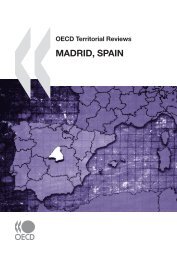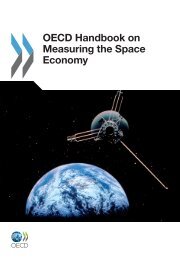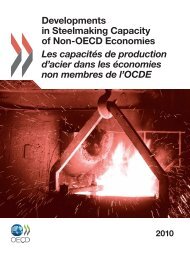Evaluating Country Programmes - OECD Online Bookshop
Evaluating Country Programmes - OECD Online Bookshop
Evaluating Country Programmes - OECD Online Bookshop
Create successful ePaper yourself
Turn your PDF publications into a flip-book with our unique Google optimized e-Paper software.
<strong>OECD</strong> 1999<br />
<strong>Country</strong> Programme Evaluations Workshop: The Case of Tanzania<br />
– Shared purpose, criteria and standards for CPEs.<br />
– Establishment of sound relationships (formal and informal) among partners,<br />
i.e. creating ability to break through cultural barriers and attitudes.<br />
Without adequate local participation which takes into account the above<br />
issues, there can be no meaningful contribution and continuous commitment from<br />
local partners in the events succeeding the evaluation process.<br />
A need for change<br />
It is a challenge to attempt a change in traditional approaches of most development<br />
programmes. It takes time, patience, energy and cost to embark in a process<br />
of change, and particularly when it involves various parties in a multi-cultural<br />
environment, a situation which is typical for a partnership development process.<br />
In reality, and given adequate resources, it is easier to work out strategies and<br />
plans in isolation, sharing results only when these are finalised. In this case,<br />
results can only be short-term; however, in the long term, costs and losses<br />
involved (both materially and emotionally) are huge. It has, therefore, been seen<br />
as necessary to change old patterns and beliefs in order to match development<br />
philosophies and principles with local contexts and, thus, ensure sustainability<br />
for the local population.<br />
Steps to secure involvement of local partners in CPEs<br />
The following steps, though not exhaustive, are simple suggestions to the process<br />
of enabling development partners-mainly donor countries – to create a conducive<br />
environment for effective local partner involvement in CPEs while at the same<br />
time maintaining an adequate level of accountability and professional evaluation<br />
standards.<br />
The process: Evaluation, be it of a country programme or any other, should be<br />
seen as a continuous process which entails a critical assessment, recognising and<br />
learning from positive and negative cases which are vital for the future. Hence,<br />
together with all partners concerned, adequate time needs to be given to the planning<br />
of all evaluation events to be anticipated under a specific country programme.<br />
The outputs of such events will culminate in valuable insights to the inputs<br />
required for an effective CPE.<br />
Policies, strategies and agendas: The policies and strategies of respective<br />
countries in partnership co-operation should be made clear during discussion of<br />
key issues related to programme planning and evaluations. Likewise, the development<br />
agendas of participating partners should be discussed openly and in a transparent<br />
manner. This should also be seen as a continuous process owing to the fact<br />
that there are a lot of dynamics and changes in development co-operation.<br />
141

















![CQE=U]^\]Z: KAZAKHSTAN - OECD Online Bookshop](https://img.yumpu.com/3915768/1/190x253/cqeuz-kazakhstan-oecd-online-bookshop.jpg?quality=85)